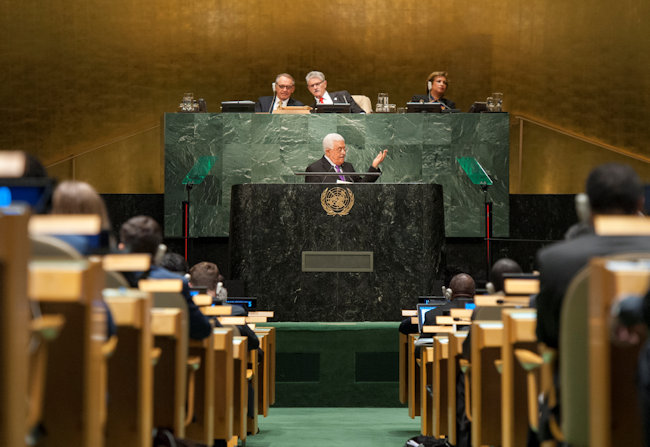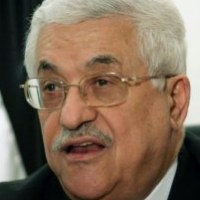![]()
Friday, October 2, 2015 | by Khaled Abu Toameh
Originally published under the title “Abbas’s Trap: The Big Bluff” by Gatestone Institute. Republished with permission.

View of the General Assembly Hall as Mahmoud Abbas addresses the general debate of the General Assembly’s seventieth session, 30 September 2015, New York. (UN Photo/Cia Pak)
After weeks of threatening to drop a bombshell during his speech before the UN General Assembly, Palestinian Authority (PA) President Mahmoud Abbas on September 30 proved once again that he is an expert in the art of bluffing.
In the end, the bombshell he and his aides promised to detonate at the UN turned out to be a collection of old threats to abrogate signed agreements and a smear campaign against Israel.
There was nothing dramatic or new in Abbas’s speech. During the past few years, he and some of his aides have been openly talking about the possibility of cancelling the Oslo Accords if Israel does not fulfill its obligations towards the peace process.
In his speech, Abbas repeated the same threat, although some Western political analysts and journalists misinterpreted it as an announcement that he was abrogating signed agreements with Israel.
As one of Abbas’s advisors, Mahmoud Habbash, later clarified,
“President Abbas did not cancel any agreements. He only made a threat, which is not going to be carried out tomorrow.”
Now, it is obvious that the talk about a bombshell was mainly intended to create tension and suspense ahead of Abbas’s speech. This is a practice that Abbas and his aides have become accustomed to using during the past few years in order to draw as much attention as possible.
The threat to cancel the Oslo Accords with Israel is not different from other threats that Abbas and his aides have made over the past few years. How many times has Abbas threatened in the past to resign from his post or suspend security coordination with Israel? In the end, he did not carry out any of these threats.
Abbas is unlikely, also this time, to carry out his latest threat to cancel the agreements with Israel. He knows that such a move would mean dissolving his Palestinian Authority and the end of his political career. But Abbas would like the world to believe that he has already cancelled the Oslo Accords. Judging from the inaccurate headlines in the international media, he seems to have achieved his goal.
Now, many in the international community are falsely convinced that Abbas has annulled all signed agreements with Israel. Those who rushed to declare the death of the Oslo Accords fell into Abbas’s trap.
Abbas’s threats are mainly designed to scare the international community into pressuring Israel to offer Abbas more concessions. He is hoping that the inaccurate headlines concerning the purported abrogation of the Oslo Accords will cause panic in Washington and European capitals, prompting world leaders to demand that Israel give Abbas everything he is asking for.
Abbas is also hoping that his recurring threats will put the Israeli-Palestinian conflict back at the world’s center stage. Abbas and the Palestinians feel that the world has lost interest in the conflict, largely due to the ongoing turmoil in the Arab world, the refugee crisis in Europe and the growing threat of the Islamic State terror group.
This concern was voiced by the PLO’s Saeb Erekat immediately after President Barack Obama’s speech at the UN General Assembly, which did not include any reference to the Israeli-Palestinian conflict.
Expressing “disappointment” over Obama’s speech, Erekat asked,
“Does President Obama believe he can defeat ISIS and terrorism, or achieve security and stability in the Middle East, by ignoring the continued Israeli occupation, settlement expansion and the continued attacks on al-Aqsa Mosque?”
Of course, there is no direct link between Israeli “occupation” and settlements and the growing threat of radical Islam or the turmoil in the Arab world. The Islamic State is not beheading Muslims and non-Muslims because of the settlements or “occupation.” The Islamic State is not committing all these atrocities because it wants to “liberate Palestine.” Its main objective is to conquer the world after killing all the “infidels” in order to establish a sharia-ruled caliphate. The Islamic State would kill Erekat and Abbas — and many other Muslims — on its way to achieve its goal. In the eyes of the Islamic State, folks like Erekat and Abbas are a fifth column and traitors.
But instead of supporting the world’s war against the Islamic State and radical Islam, Abbas and Erekat want the international community to look the other way and devote all its energies and attention to the Israeli-Palestinian conflict. The tens of thousands of Arab refugees who are now seeking asylum in several European countries could not care less about the “occupation” and settlements. These people have lost everything they used to possess and their only dream is to either return to their homes and lands safely or start a new life in Europe and the US.
Abbas wanted worldwide attention in wake of the international community’s preoccupation with the refugee crisis and the radical Islam threat. For now, he appears to have achieved his goal, largely thanks to the international community’s misreading of his speech at the United Nations.
But while everyone is busy talking about Abbas’s bombshell, only a few have noticed that his speech consisted mostly of anti-Israel rhetoric that is likely to aggravate tensions between the Palestinians and Israel. Abbas used the UN General Assembly podium to make grave charges against Israel concerning “apartheid,” settlements and tensions on the Temple Mount. His fiery rhetoric, which has been partially welcomed by Hamas and other radical Palestinian groups, is likely to exacerbate tensions between Israelis and Palestinians and encourage more Palestinians to engage in violence.
It is this form of incitement that destroys any chance of peace between Israel and the Palestinians. This is the kind of rhetoric that prompts Palestinian youths to take to the streets and throw rocks and firebombs at Israeli civilians and policemen. Still, the international media, by and large, chose to ignore this destructive part of Abbas’s speech.
Ironically, Abbas declared in his speech that, “We are working on spreading the culture of peace and coexistence between our people and in our region.” But his harsh words against Israel, in addition to continued anti-Israel incitement in the Palestinian media, prove that he is moving in the opposite direction. As Abbas was addressing the UN General Assembly, some of his loyalists in Ramallah threatened and expelled Israeli Jewish journalists who came to interview Palestinians. This is certainly not a way to spread a “culture of peace and coexistence.”
Khaled Abu Toameh, an Arab Muslim, is a veteran award-winning journalist who has been covering Palestinian affairs for nearly three decades. He is a Distinguished Senior Fellow at the Gatestone Institute. Follow Khaled Abu Toameh on Twitter.



 RSS
RSS










Latest Comments
Hello Mike, Thank you for your positive feedback to the article. I felt there wasn’t too much critical analysis of ...
Thanks for this considered and well constructed article. A follow up article on the manner in which the editorial contro...
THE CLUELESSNESS OF CLAIMING THAT OBAMA'S MIDDLE EAST POLICIES WERE A FAILURE CANNOT BE FURTHER FROM THE TRUTH, WHAT THE...
As long as Obama is the president of the usa do not trust the us government......
Thank you for an good read....